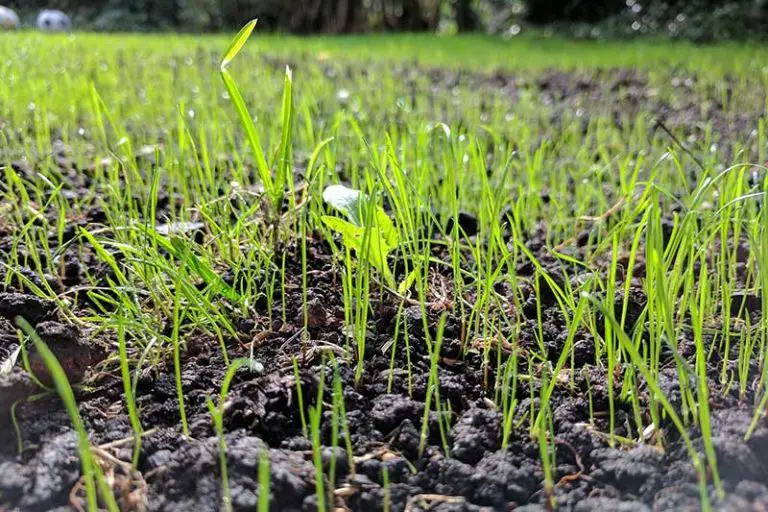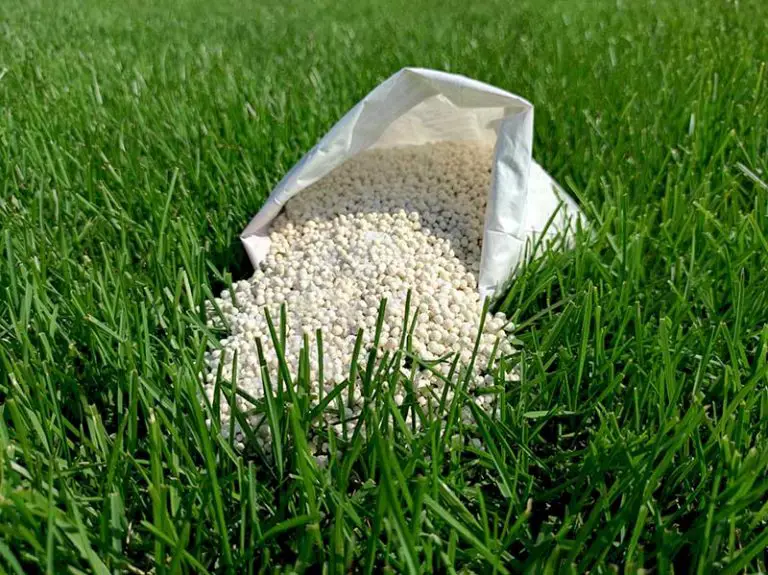What is Organic Fertilizer?
‘Fertilizer’ is a general term used to refer to substances that contain the nutrients needed by plants to grow, these mainly being nitrogen (N), phosphorus (P), and potassium (K), which can be applied to their soil to ensure they remain healthy and thriving under suboptimal conditions.
Inorganic fertilizer is a synthesised mixture of the vital nutrients needed by plants, while organic fertilizers are made from natural sources of these nutrients.
But which fertilizer should you choose, organic or inorganic? This article will explain the difference between organic and inorganic fertilizers, and provides some guidance on whether going down the organic route is the right move for your lawn.
So, What is Organic Fertilizer?
Organic fertilizers are simply any fertilizers that have been derived from organic sources, as an end product or byproduct of naturally occurring processes. They can contain either plant, animal, or mineral-based materials, such as composted organic matter or animal manure.
They usually contain low concentrations of plant nutrients, but the types and amounts of each nutrient found in organic fertilizers will vary greatly depending on the source material that they’re made of, with the best sources being materials that are readily biodegradable. The most prevalent nutrients found in fertilizers are phosphorus, nitrogen, and potassium, in addition to other nutrients like calcium, magnesium, and sulfur.
What is the Use of Organic Fertilizer?
Aside from their main use of enriching the soil with lots of essential nutrients, organic fertilizers bring a number of benefits that will keep your plants healthy for a longer period of time than inorganic fertilizers.
Organic fertilizers will gently nurture the soil with organic matter to restore and maintain soil fertility over time. This reduces your lawn’s dependency on chemical inputs, and also significantly reduces the risk of a toxic chemical buildup that could cause fertilizer burn on your plants. By nurturing the soil in this way, organic fertilizer encourages the growth of strong, healthy plants, in addition to enhancing the biological activity and biodiversity of the soil. Organic fertilizers aerate the soil as they break down, improving its texture and structure, and increasing its ability to hold water and nutrients.

What is the Difference Between Organic and Inorganic Fertilizer?
Organic and inorganic fertilizers are both designed with the same end goal in mind, which is to provide plants with any supplementary nutrients that are missing from the soil that they’re growing in. But, the two types differ in their processes, and they both have their own benefits and drawbacks depending on what your fertilization requirements are.
Inorganic Fertilizer Has to Be Manufactured
Although some inorganic fertilizers do come from naturally occurring mineral sources, they must go through a manufacturing process before they can be used properly, hence why they aren’t classed as organic. They will usually only contain a small number of nutrients, which are generally nitrogen, phosphorus, potassium, sulfur, and occasionally some micronutrients, either by themselves or in combination with others.
Organic and Inorganic Fertilizers Differ in their Processes
Organic and inorganic fertilizers have different processes when enriching soil with nutrients. Organic fertilizers work more slowly, releasing nutrients into the soil when it becomes warm and moist, which usually corresponds with when your plants need them the most. These fertilizers rely on organisms in the soil to break down the organic matter, so this slow-release method will take longer to supply the plants with nutrients.
Contrastingly, inorganic fertilizers work straight away, as they are manufactured to be in a form that is readily taken up by plants. However, the biggest drawback is that inorganic fertilizer puts your lawn and plants at risk of being burnt due to the higher concentration of nutrients, which can cause your grass to turn yellow or die off completely.
Organic Fertilizer is More Environmentally Friendly
Organic fertilizers are biodegradable, renewable, sustainable, and in general, they are far more environmentally friendly than inorganic fertilizers. The downside is that organic fertilizers also cost a bit more than inorganic fertilizers, but when weighing up the pros and cons, the long-term benefits could justify the price. Even after your plants have taken up all the nutrients they need, organic fertilizers will keep improving the texture and composition of the soil for months or years to come.
Additionally, the production of organic fertilizers requires a fraction of the fossil fuels necessary to produce inorganic fertilizers, and releases fewer greenhouse gases into the atmosphere than inorganic production does. So, while synthetic fertilizers are a cheap and quick solution, they have much more of a negative impact on the environment and provide little long-term value to your lawn.
What is Organic Fertilizer Made From?
To be classed as organic, fertilizers must only contain matter that has been naturally derived from organic sources. All organic fertilizers will be made up of either plant matter, animal materials, or a powdered form of mined rock minerals.
Plant-based Fertilizer
Plant-based fertilizers generally contain lower levels of nitrogen, phosphorus, and potassium and will break down more quickly than other types of organic fertilizers, but their main benefit is more to condition the soil rather than to provide it with nutrients. They help to improve drainage and moisture retention in low-quality soil, and some will provide an amount of trace minerals and micronutrients.
Types of plant-based fertilizer:
- Alfalfa meal
- Compost
- Cottonseed meal
- Molasses
- Legume cover crops
- Green manure cover crops
- Kelp seaweed
- Compost tea
Animal-based Fertilizer
Animal-based fertilizers are derived from either animal matter or animal byproducts. They contain high levels of nitrogen which can be beneficial for soils lacking this nutrient, as nitrogen plays an essential role in how plants grow, process food, and create chlorophyll. They work best to encourage strong growth in plants during their first weeks of growing. However, animal-based fertilizers should be applied carefully to avoid overloading the soil with excessive amounts of nitrogen and salts, as this can kill off useful microbes and may prevent your plants from flourishing.
Types of animal-based fertilizer:
- Manure
- Bone meal
- Blood meal
- Fish emulsion
- Milk
- Urea (urine)
- Manure tea
Mineral-based Fertilizer
Mineral-based fertilizers are made by crushing up mineral rocks into a powdered form to be applied directly to soil. Not only do they add nutrients to the soil, but they can also be applied to raise or lower its pH level when necessary.
Types of mineral-based fertilizer:
- Calcium
- Epsom salt (magnesium or sulphur)
How Long Does Organic Fertilizer Take to Work?
Organic fertilizers function less as an instantly-absorbed fix like their synthetic counterparts, but more to gradually enrich the soil that they’re applied to, providing a longer-term solution for soils low in nutrients.
As the natural matter in the organic fertilizer decomposes, the soil becomes enriched with its nutrients and beneficial microorganisms, improving its structure and texture. This has a knock-on effect of improving the soil’s ability to hold on to nutrients, and organic fertilizers will continue to help the soil build up the nutrients it needs to feed plants.
The disadvantage of this process is that it takes a lot longer to feed your plants than synthetic fertilizer. Inorganic fertilizers are manufactured to be taken up by soil and plants immediately, whereas organic fertilizers rely on the decomposition of the organic matter, which can take around two to six weeks. However, it should be noted that while they take longer to work, organic fertilizers will continually nourish the soil for anywhere between three months up to 10 years.
What are the Limitations of Organic Fertilizer?
Even though there are a number of significant benefits of using organic fertilizer, there are also some limitations that should be considered.
Organic Fertilizer Takes Longer to Work
As we have discussed, organic fertilizers take longer to work than synthetic fertilizers, so they aren’t ideal for soil and plants that are in a poor state and need an instant fix of nutrients. This is because organic fertilizers contain a lower concentration of readily available nutrients, which also means that plants and lawns using organic fertilizers may not have the same vibrant colors that are seen when inorganic fertilizers have been used.
Organic Fertilizer Depends on Climate and Microorganisms to Work
How organic fertilizers release their nutrients can be affected by both the climate and presence of microorganisms in the soil, and they may also struggle to work in damaged soils that don’t have adequate biological conditions for the natural matter to decompose. Additionally, if the organic matter isn’t able to fully decompose, it may contain potentially dangerous pathogens that can cause damage to both the environment and to human health.
Organic Fertilizer is More Labor-Intensive
Organic fertilizers are very labor-intensive compared to inorganic fertilizers. They are bulky, messy, and sometimes unpleasant materials, which makes moving and spreading it around more of a difficult task than it is for synthesized fertilizers, even with the help of a fertilizer spreader.
If you’re thinking about fertilizing your lawn, refer to our guide How to Fertilize a Lawn for all you need to know about the best practices of lawn fertilization.







